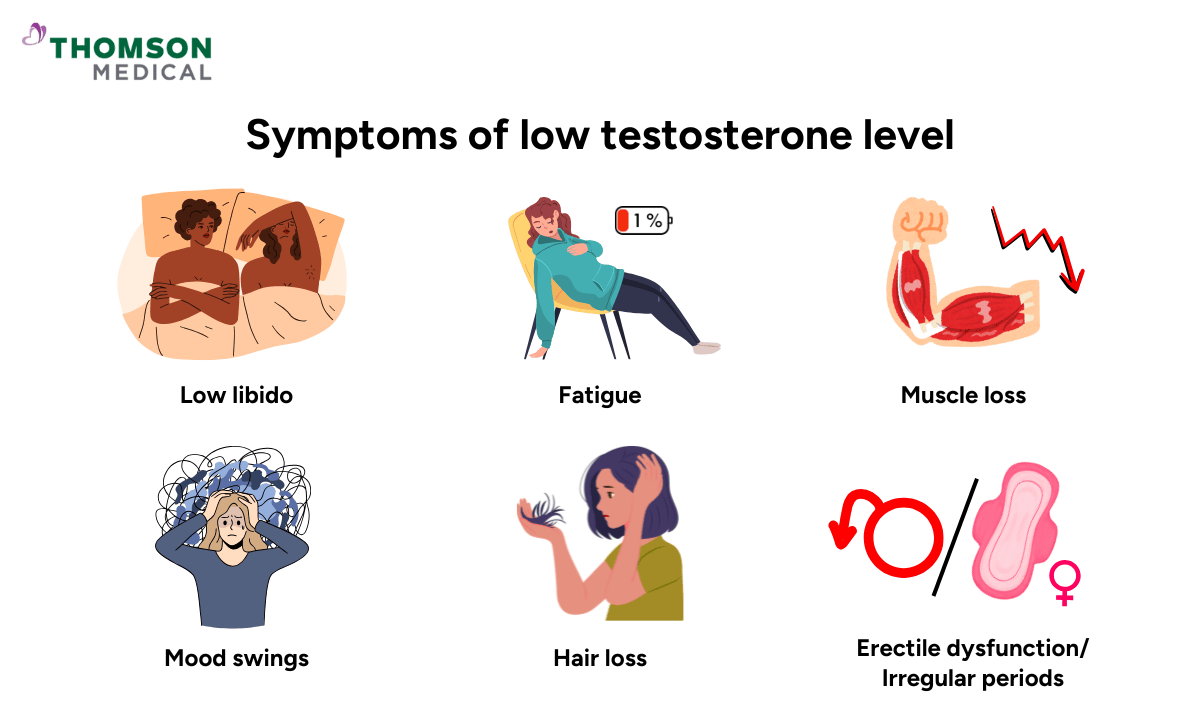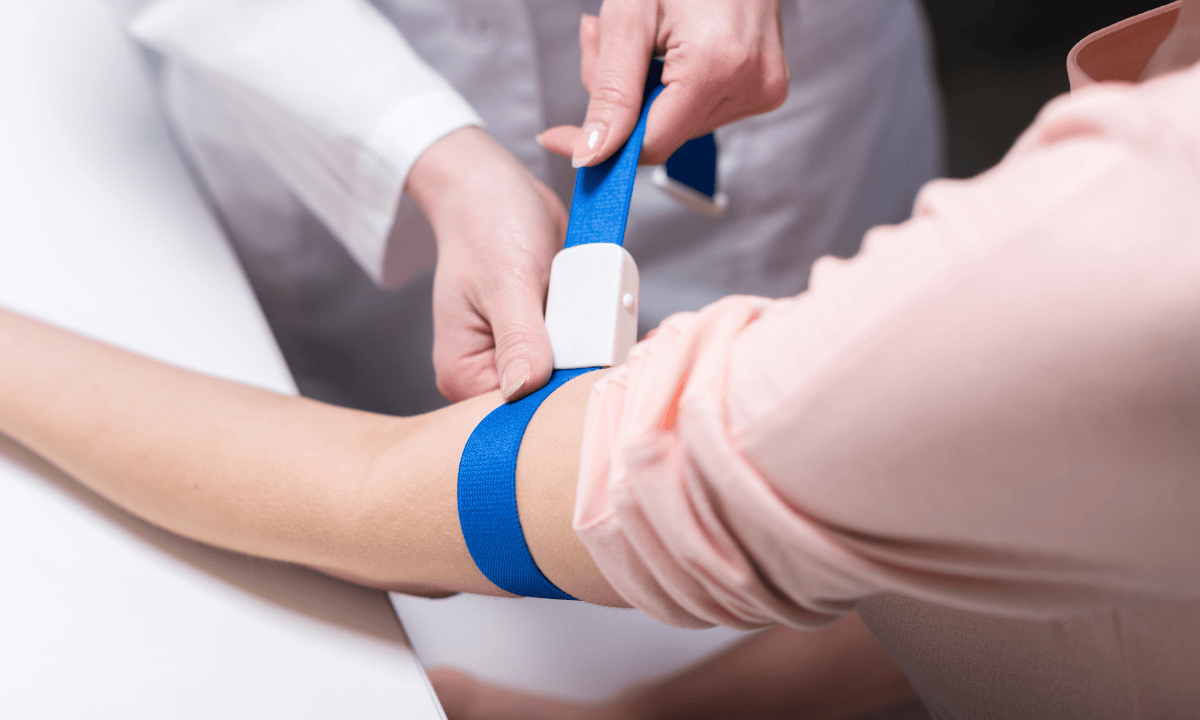Testosterone is one of the most important hormones in the body. It affects mood, energy levels, muscle strength, bone density, and sexual health. Although testosterone is often labelled a male hormone, women also produce small amounts of it.
As these hormones are important for both men's and women's health, having too high or too low testosterone can affect your quality of life. For this reason, testing your testosterone levels can offer helpful details about your hormonal health.
What is testosterone and why is it important?
Testosterone is a sex hormone that is found both in men and women, but men have more of it. It plays a wide range of roles, such as:
Development of male secondary sexual characteristics, including:
Growing facial or body hair
Deepening of the voice
Increasing muscle mass
Maintaining libido, mood stability, and energy levels
Contributing to bone density, fat distribution, and red blood cell production
Even though testosterone levels are lower in women, it still affects sexual desire, muscle and bone health, and other metabolic functions.
What is a testosterone level test?
A testosterone level test is a simple blood test that tells you how much testosterone is in your blood. It has some uses, such as:
Helping your doctor diagnose underlying conditions such as polycystic ovary syndrome (PCOS), tumors of the ovary or adrenal gland
Guiding hormone-related treatments if necessary
Monitoring the effects of any therapies you undergo
There are several ways to measure testosterone levels, each providing a slightly different picture.
Total testosterone level test
This test measures the overall amount of testosterone in your blood serum (the liquid portion of blood that remains after clotting). It includes both the part that is attached to proteins (which is mostly inactive) and the free part (which is active).
Free testosterone test
This test only looks at the free testosterone circulating in your blood. Because it isn't attached to proteins, your body can use it right away in its biologically active form.
Bioavailable testosterone test
A bioavailable testosterone test checks for free testosterone and testosterone that is loosely bound to a protein called sex hormone binding globulin (SHBG). This test gives a more accurate picture of your usable testosterone levels because your body can easily use both forms.
Depending on your age, gender, symptoms, and other factors, your doctor may order one, two, or all three testosterone tests to assess how these hormones are working in your body.
When do I need a testosterone test?
Testosterone testing can tell you a lot about your health. You may need one if you experience any of the following symptoms:
Symptoms of low testosterone

Both men and women can have low testosterone. Common symptoms of testosterone deficiency syndrome include:
Low sex drive
Fatigue or low energy
Loss of muscle mass or strength
Irritability, mood swings, depression, or anxiety
Thinning hair or hair loss
Erectile dysfunction (in men)
Irregular menstrual cycles (in women)
Symptoms of high testosterone
High testosterone can also cause health concerns, though it's not as common. Possible signs are:
Increased muscle mass
Acne or oily skin
Irritability, mood changes, depression, or anxiety
High blood pressure or frequent headaches
Difficulty sleeping
Erectile dysfunction (in men)
Irregular or absent periods, excessive facial or body hair (in women)
Other situations
Even if you don’t have obvious symptoms, your doctor may recommend testing if:
- You are undergoing hormone therapy and need monitoring
- You are dealing with unexplained infertility or puberty that starts unusually early or late
You have a medical condition known to affect hormone balance, such as:
- Obesity
- Liver disease
- Use of medications affecting hormones
Our men's health specialists
Loading...
What happens during the test?

To get the most accurate results, let's first go over the steps you can take prior to the test.
Preparing for the test
Testosterone levels go up and down naturally throughout the day, with the highest levels in the morning. So, your doctors will likely recommend taking the blood test early in the day, usually between 7 and 10 am.
If your doctor wants you to do other tests, you might have to fast. You might also be told to avoid hard exercise and supplements or medicines that can change hormone levels, like steroids or hormone-based medicines.
During the test
Your doctor usually takes a blood sample from a vein in your arm. If you are testing more than one testosterone panel, a special tube may be used.
After the test
After the test, your blood sample is then sent to the lab to be processesed. The time to get results can be different depending on what you are measuring. In Singaporean clinics, it usually takes a few days to receive total testosterone results and several weeks for more complicated panels.
Once the results are available, your doctor will consider your age, gender, symptoms, and binding protein levels before making suggestions.
What do the results of my testosterone level test mean?
Results differ based on age, gender, time of day, and the specific laboratory techniques. Here's what your testosterone test results can tell you:
Low total testosterone but normal free or bioavailable testosterone
This result suggests increased binding by proteins. It means that your body has enough testosterone that is active, but it is mostly tied up and not free to use. In these situations, free or bioavailable measures are important.
Both total and free or bioavailable are low
These results suggest that you may have a testosterone deficiency, which requires further investigation.
High total testosterone level
If you have a high total testosterone level but no symptoms, you may not need to treat it right away. But if you do have symptoms of too much sex hormone, further investigation is necessary.
Your doctor is your best guide. They don't just look at your results; they also look at your whole clinical picture.Request an appointment with specialists at Thomson Medical for a personalised screening and advice based on your age, lifestyle, and health history.
Testosterone level test price in Singapore
The cost of a testosterone test varies depending on the type of test and where you take it (public or private facility). The table below shows the general prices for testosterone tests in Singapore.
| Test types | Price (SGD) |
|---|---|
| Total testosterone | 30-40 |
| Total & free testosterone | 140-200 |
| Full male testosterone panel | 200-250 |
Always ask your chosen clinic for the most up-to-date prices, whether a doctor’s consultation is included, whether GST is added, and whether you need to fast or have your test done in the morning for accuracy.
Unfortunately, testosterone tests are not covered by Medisave or the Community Health Assist Scheme (CHAS) in Singapore. However, some private health insurance plans may provide coverage, depending on the policy. To further reduce costs, some healthcare facilities in Singapore may offer subsidised or affordable tests.
FAQ
How do I test my testosterone level?
The most reliable way to test testosterone levels is through a blood test, usually performed in the morning when hormone levels are highest. Your doctor will draw blood from a vein in your arm and send it for analysis.
What is a normal testosterone level by age?
Depending on the lab and the unit of measurement, testosterone levels can be different. For men between the ages of 18 and 50, total testosterone levels are usually between 300 and 1000 ng/dL (or the same amount in nmol/L). It is best to compare your results to the normal range on your own test report because reference values can be different from lab to lab.
Should I be worried if I have an abnormal testosterone test result?
Not always. If you don't have any symptoms, a single low or high result doesn't always mean there's a problem. If your results are consistently abnormal or you have symptoms, you should see a doctor.
What are the risks of a testosterone blood test?
The test is very safe. It involves a normal blood draw, so the most common minor side effects are some bruising, mild pain, or a small risk of infection at the needle site.
Can I ask my GP for a testosterone test?
Yes. Your GP can arrange a testosterone test and explain the results to you. If the issue is complex or your testosterone levels consistently show abnormalities, your GP may refer you to an endocrinologist or another specialist for additional testing.
How to fix low testosterone?
Lifestyle changes, like losing weight, exercising regularly, getting better sleep, lowering stress, and eating well, can make a big difference in many cases. Managing underlying health issues, testosterone therapy and regular follow-up with your doctor are important for keeping an eye on your hormone levels, any side effects, and your overall health.
The information provided is intended for general guidance only and should not be considered medical advice. For personalised recommendations and advice based on your unique situation, please consult a specialist at Thomson Medical.Request an appointment with Thomson Medical today.
For more information, contact us:
Thomson Medical Concierge
- 8.30am - 5.30pm
- WhatsApp: 9147 2051
Need help finding the right specialist or booking for a group?
Our Medical Concierge is here to help you. Simply fill in our form, and we'll check and connect you with the right specialist promptly.
Notice:
The range of services may vary between Thomson clinic locations. Please contact your preferred branch directly to enquire about the current availability.
Get In Touch